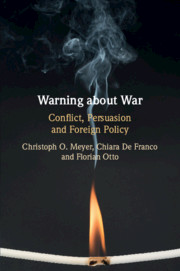Book contents
- Warning about War
- Warning about War
- Copyright page
- Contents
- Figures
- Tables
- Acknowledgements
- Chapter 1 Conflict Warnings as Persuasion Attempts
- Chapter 2 A Theory of Conflict Warning as Persuasion in Foreign Policy
- Chapter 3 Inside-Up Warnings within States and International Organisations
- Chapter 4 Outside-In Warnings
- Chapter 5 Outside-In Warnings
- Chapter 6 (Mis-)identifying Warnings and the Problem of Hindsight Bias
- Chapter 7 What Makes Individual Officials Persuasive Warners?
- Chapter 8 Explaining Differences in Persuasiveness
- Chapter 9 Warning within EU Institutions and the Ukrainian-Russian Conflict of 2013–2014
- Chapter 10 When Are Warnings Heeded and What Can Warners Do?
- References
- Index
Chapter 5 - Outside-In Warnings
Persuasion by Journalists and Media Organisations*
Published online by Cambridge University Press: 23 August 2019
- Warning about War
- Warning about War
- Copyright page
- Contents
- Figures
- Tables
- Acknowledgements
- Chapter 1 Conflict Warnings as Persuasion Attempts
- Chapter 2 A Theory of Conflict Warning as Persuasion in Foreign Policy
- Chapter 3 Inside-Up Warnings within States and International Organisations
- Chapter 4 Outside-In Warnings
- Chapter 5 Outside-In Warnings
- Chapter 6 (Mis-)identifying Warnings and the Problem of Hindsight Bias
- Chapter 7 What Makes Individual Officials Persuasive Warners?
- Chapter 8 Explaining Differences in Persuasiveness
- Chapter 9 Warning within EU Institutions and the Ukrainian-Russian Conflict of 2013–2014
- Chapter 10 When Are Warnings Heeded and What Can Warners Do?
- References
- Index
Summary
This chapter focuses on media organisations and journalists as sources of outside-in warnings of conflict. Conflict prevention scholars have touched on media’s role in preventive action, but not studied it in any depth. International political communication scholarship offers few relevant insights about the media as warners, as it concentrates on their role during crises or in the build-up to military interventions and wars. This chapter fills this gap by presenting original empirical research on how and when journalists communicate warnings and under what conditions these warnings may gain traction with officials and decision-makers. Our investigation is theoretically grounded in the persuasion framework of Chapter 2, but we also draw on insights from studies about the media as communicators that are in many ways distinct from other outside-in warners such as NGOs. There are three parallel research lines: (1) textual analysis of media coverage showing how news outlets have warned about eight different crises, (2) analyst surveys, and (3) interviews with foreign correspondents and capital-based foreign news editors, officials and NGO staff. Newspapers were selected according to variation across reach, political orientation and nationality; are from countries committed to conflict prevention (US, UK, France, Germany); and cover the whole political spectrum.
- Type
- Chapter
- Information
- Warning about WarConflict, Persuasion and Foreign Policy, pp. 125 - 161Publisher: Cambridge University PressPrint publication year: 2019



